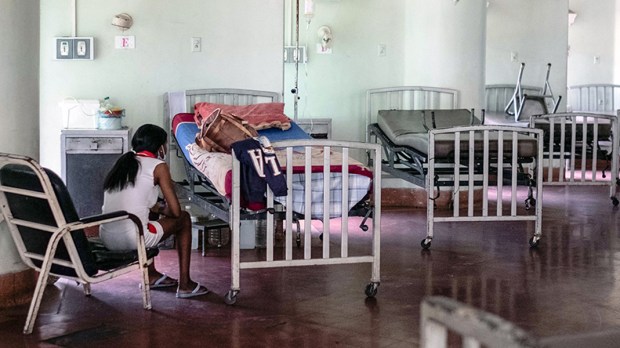As the crisis in Venezuela persists, there is seemingly no end to the suffering of ordinary citizens. They have to cope with shortage of food and other essentials of basic living; what is making their plight still worse is the scarcity and high cost of medicine, leaving many without proper care. Conditions are compounded by the breakdown of the country’s supply of electricity, which is affecting hospitals and interfering with the treatment of patients.
In an audio message sent to Aid to the Church in Need (ACN), a young doctor gives an account of her experiences, her voice trembling with emotion.
She describes how she attended a little girl suffering acute peritonitis, after having already arrived at the hospital with a ruptured appendix. As a result they had to apply the necessary treatment to extract the festering liquid, but they had no antibiotics for her subsequent post-op treatment.
“Her Papa told me, with tears in his eyes, that he could not continue buying the medication, because each treatment cost 50,000 bolivars, and she needs three doses a day,” the doctor explains.
At present, the minimum monthly salary in Venezuela is 20,000 bolivars, so that the father of this little girl would have to save up almost 8 months’ salary in order to be able to purchase a single day’s treatment of the antibiotic.
In her moving account, the doctor describes how, after cleaning up the wound, she went looking for the little girl’s father to explain to him the gravity of his daughter’s condition; she found him kneeling on the floor, weeping.
“On emerging from the operating theater, after completing the procedure, I went looking for her daddy, but couldn’t find him, because he was kneeling down, weeping in a corner, with his head against the wall.”
She continues, with anguish in her voice, “I feel as though we are simply watching people die.”
She also berates the country’s political leaders for their poor performance. “I don’t understand the politicians. This is affecting us all …”
“We doctors can put up with being without light and without water, we can find a way of working around it, but I cannot bear to see our poorest people suffering and burying their children.”
On April 2, 2019, the Venezuelan bishops’ conference in a statement reaffirmed “the dignity of the human person and his inalienable rights”; they denounced the lack of respect for human rights and the “crimes against humanity” to which the Venezuelan people are subjected, including “the deliberate imposition of [harmful] conditions of life, such as the depriving [people] of access to food and medication.”
“Unfortunately this has been happening in our own country, beneath the complacent gaze of the authorities who have the responsibility of watching over the respect for and defense of human rights,” the bishops said.
The bishops urged a redoubling of prayers for Venezuela, in order to achieve “the necessary conversion.”
The prelates appealed to the Virgin Mary to “accompany our people on the Way of the Cross they are now walking, in the hope of the Paschal liberation that was achieved by her Son Jesus Christ.”
For more information and information on how to help visitwww.churchinneed.org

